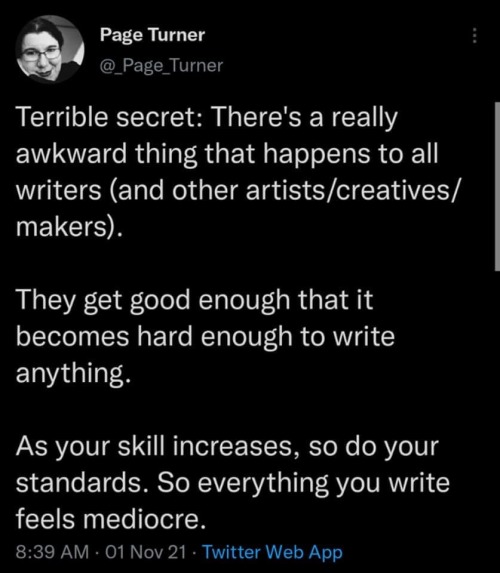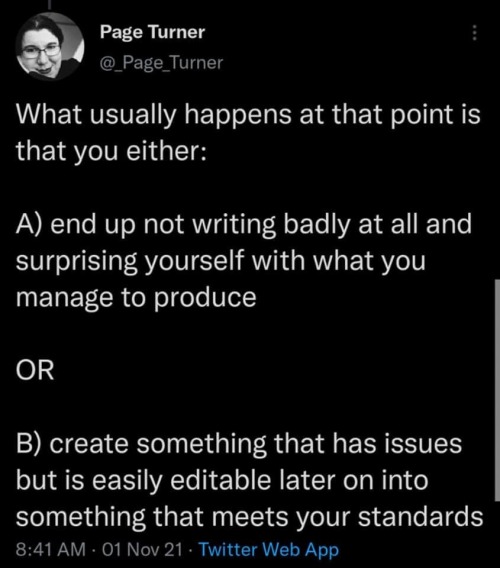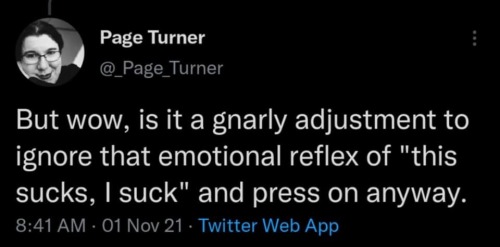Latest Posts by poetatwork - Page 3
i would describe myself as a “stay-at-home dragon”

you don’t talk too much. you aren’t too loud. you aren’t too needy. you aren’t too sensitive. you aren’t too this, or that. you aren’t too much anything. you will never be too much: you are you, and you are allowed to take up space. you are allowed to exist however you choose.
I know there's a lot of advice for handling things like depression and its so fucking easy for people to say "just do this and you'll feel better!" and I hate that, I fucking despise it, but I'm also gonna throw in my two cents about what is personally helping me get out of bed some days and genuinely, not kill myself.
Its taking care of nature.
Seriously. It sounds stupid and some days it feels stupid, but I put up bird feeders because I live in a semi-rural area where human activity is decimating the local bird population and options for safe feeding. So I put up bird feeders. And now I have like 83 different birds flocking to my garden on the daily and screaming at my window if the feeders are empty. And I've seen generations of baby birds brought to my garden by their parents because this is where the food is.
And I researched what plants and flowers were native to my area and I spent like $5 on a few different seed packets and sprinkled them around the grass and the sad empty flowerbeds and the lawn because the bees have nothing to eat and that's awful and it turns out wildflowers will fucking GROW the moment you look away, but now every spring and summer my lawn is a pretty little multi-colored bug haven.
And I've even gotten the chance to save a few little bug lives because of it. I've taken in cold-shocked bees and given them a warm little tupperware to recover in. I've fed bugs sugar water to get their energy back to take their food home. I've given dying bugs a sheltered, safe place to spend their last moments.
I planted a veggie garden. And I know I'm very lucky in that I have the space to do that, but also, you can grow a lot of things indoors. My friend has literally the smallest apartment you can imagine but she grows chives in her bathroom and grows five radishes at a time in a pot in the kitchen. Literally five. But it makes her so happy every single time she pulls them up or trots off to the bathroom to snip some chives.
I pick trash up every two weeks. The pick stick was like $4 online and I just put the bag out with my bi-weekly trash pick-up and its disgusting but but nobody else is gonna do it and I've only got finite time on this earth. If nobody else is going to pick up that can, I will. Because some innocent wild animal doesn't deserve to get hurt by human ignorance, and I deserve to walk home and see pretty flourishing nature instead of depressing discarded trash like I feel like most days.
I've left water out for the wildlife and watched hedgehogs, local dogs on their walks, squirrels and all sorts stop by to take a drink, because humans are fucking selfish and we're making something as basic as water so hard to access for anyone but ourselves, but I can fix a little bit of that just by putting out a bowl. Sometimes I don't even have to remember to fill it because the rain will fill it for me, and its kind of like nature's way of saying "you're helping me so I'm going to help you out too." Which is neat.
Like most days I do not want to be living on this earth but my god earth did not get a choice about us living here, and we're ruining it, and it actually feels so good to help stop and un-do a little bit of that destruction.
And you don't even have to try everything I do. If the only thing you've got the spoons to do is buy one bird feeder and you only remember to fill it once a month, its still something. That once a month could mean the difference between starvation and a full belly to a bird.
Again, none of this is obligatory and I'm not saying at all this is some magical cure for depression, but personally these things are things which are helping me slowly find things to keep getting out of bed for and things to feel a sense of self worth and satisfaction over. I feel better both in and about myself when I feed the birds, when I see the bugs in the garden, when I pick up the trash.
If its something you haven't considered yet, it might be worth a try.
A friend once told me that when they are struggling with getting laundry done, she pretends it is her sworn duty to smuggle the young prince out of the castle to safety, disguised in a laundry hamper.
Now, when I am struggling with hygiene, I pretend I am part of a village with an annual festival, and I get one day a year to spend luxuriously at a bathhouse in preparation.
What my friend imparted on me was the skill of turning mundane tasks into fantastical adventures to make them more compelling and bearable.
So next time you need to go on a mental health walk, maybe consider doing reconnaissance for a secret underground organisation.
Next time cooking is too much of a chore, consider you ability to turn space station rations into a feast to the delight of your crewmates.


Anaïs Nin, from a diary entry featured in The Diary of Anaïs Nin Volume 1 1931-1934


Trista Mateer, from "Aphrodite Made Me Do It," originally published in 2024
WRITE!! WHAT!! YOU!! WANT!!
If you don't love your writing, no one else will!
I find it personally offensive how many bad writers can get published so easily.



Devin Kelly, “All That Wanting, Right?”
I just wrote 8 pages when I haven't written in months and was beginning to think I'd never be able to again. Idk what it is, but I am sharing and manifesting this energy for every writer who sees this. May you write 8 quality pages effortlessly and find joy writing once more
Sorry to break it to you but you literally have to face your fears and slaughter them. Otherwise you will live a small life that you do not want. You literally have to view your biggest fears and attack them head on. You have to fall into the abyss to find your way out. The easy path does not exist. There is no get out of jail free card. You have to allow yourself to die a spiritual death over and over again in order to reinvent yourself into the person you are actually supposed to be. And you have to be painfully honest with yourself and the people around you. It’s horrible but it’s truly the only way.
I will be gentle with myself today.

Kay Redfield Jamison, An Unquiet Mind: A Memoir of Moods and Madness
How to avoid White Room Syndrome
by Writerthreads on Instagram
A common problem writers face is "white room syndrome"—when scenes feel like they’re happening in an empty white room. To avoid this, it's important to describe settings in a way that makes them feel real and alive, without overloading readers with too much detail. Here are a few tips below to help!
Focus on a few key details
You don’t need to describe everything in the scene—just pick a couple of specific, memorable details to bring the setting to life. Maybe it’s the creaky floorboards in an old house, the musty smell of a forgotten attic, or the soft hum of a refrigerator in a small kitchen. These little details help anchor the scene and give readers something to picture, without dragging the action with heaps of descriptions.
Engage the senses
Instead of just focusing on what characters can see, try to incorporate all five senses—what do they hear, smell, feel, or even taste? Describe the smell of fresh bread from a nearby bakery, or the damp chill of a foggy morning. This adds a lot of depth and make the location feel more real and imaginable.
Mix descriptions with actions
Have characters interact with the environment. How do your characters move through the space? Are they brushing their hands over a dusty bookshelf, shuffling through fallen leaves, or squeezing through a crowded subway car? Instead of dumping a paragraph of description, mix it in with the action or dialogue.
Use the setting to reflect a mood or theme
Sometimes, the setting can do more than just provide a backdrop—it can reinforce the mood of a scene or even reflect a theme in the story. A stormy night might enhance tension, while a warm, sunny day might highlight a moment of peace. The environment can add an extra layer to what’s happening symbolically.
Here's an example of writing a description that hopefully feels alive and realistic, without dragging the action:
The bookstore was tucked between two brick buildings, its faded sign creaking with every gust of wind. Inside, the air was thick with the scent of worn paper and dust, mingling with the faint aroma of freshly brewed coffee from a corner café down the street. The wooden floorboards groaned as Ella wandered between the shelves, her fingertips brushing the spines of forgotten novels. Somewhere in the back, the soft sound of jazz crackled from an ancient radio.
Hope these tips help in your writing!
The Neurodivergent Writer’s Guide to Fun and Productivity
(Even when life beats you down)
Look, I’m a mom, I have ADHD, I’m a spoonie. To say that I don’t have heaps of energy to spare and I struggle with consistency is an understatement. For years, I tried to write consistently, but I couldn’t manage to keep up with habits I built and deadlines I set.
So fuck neurodivergent guides on building habits, fuck “eat the frog first”, fuck “it’s all in the grind”, and fuck “you just need time management”—here is how I manage to write often and a lot.
Focus on having fun, not on the outcome
This was the groundwork I had to lay before I could even start my streak. At an online writing conference, someone said: “If you push yourself and meet your goals, and you publish your book, but you haven’t enjoyed the process… What’s the point?” and hoo boy, that question hit me like a truck.
I was so caught up in the narrative of “You’ve got to show up for what’s important” and “Push through if you really want to get it done”. For a few years, I used to read all these productivity books about grinding your way to success, and along the way I started using the same language as they did. And I notice a lot of you do so, too.
But your brain doesn’t like to grind. No-one’s brain does, and especially no neurodivergent brain. If having to write gives you stress or if you put pressure on yourself for not writing (enough), your brain’s going to say: “Huh. Writing gives us stress, we’re going to try to avoid it in the future.”
So before I could even try to write regularly, I needed to teach my brain once again that writing is fun. I switched from countable goals like words or time to non-countable goals like “fun” and “flow”.
Rewire my brain: writing is fun and I’m good at it
I used everything I knew about neuroscience, psychology, and social sciences. These are some of the things I did before and during a writing session. Usually not all at once, and after a while I didn’t need these strategies anymore, although I sometimes go back to them when necessary.
I journalled all the negative thoughts I had around writing and try to reason them away, using arguments I knew in my heart were true. (The last part is the crux.) Imagine being supportive to a writer friend with crippling insecurities, only the friend is you.
Not setting any goals didn’t work for me—I still nurtured unwanted expectations. So I did set goals, but made them non-countable, like “have fun”, “get in the flow”, or “write”. Did I write? Yes. Success! Your brain doesn’t actually care about how high the goal is, it cares about meeting whatever goal you set.
I didn’t even track how many words I wrote. Not relevant.
I set an alarm for a short time (like 10 minutes) and forbade myself to exceed that time. The idea was that if I write until I run out of mojo, my brain learns that writing drains the mojo. If I write for 10 minutes and have fun, my brain learns that writing is fun and wants to do it again.
Reinforce the fact that writing makes you happy by rewarding your brain immediately afterwards. You know what works best for you: a walk, a golden sticker, chocolate, cuddle your dog, whatever makes you happy.
I conditioned myself to associate writing with specific stimuli: that album, that smell, that tea, that place. Any stimulus can work, so pick one you like. I consciously chose several stimuli so I could switch them up, and the conditioning stays active as long as I don’t muddle it with other associations.
Use a ritual to signal to your brain that Writing Time is about to begin to get into the zone easier and faster. I guess this is a kind of conditioning as well? Meditation, music, lighting a candle… Pick your stimulus and stick with it.
Specifically for rewiring my brain, I started a new WIP that had no emotional connotations attached to it, nor any pressure to get finished or, heaven forbid, meet quality norms. I don’t think these techniques above would have worked as well if I had applied them on writing my novel.
It wasn’t until I could confidently say I enjoyed writing again, that I could start building up a consistent habit. No more pushing myself.
I lowered my definition for success
When I say that nowadays I write every day, that’s literally it. I don’t set out to write 1,000 or 500 or 10 words every day (tried it, failed to keep up with it every time)—the only marker for success when it comes to my streak is to write at least one word, even on the days when my brain goes “naaahhh”. On those days, it suffices to send myself a text with a few keywords or a snippet. It’s not “success on a technicality (derogatory)”, because most of those snippets and ideas get used in actual stories later. And if they don’t, they don’t. It’s still writing. No writing is ever wasted.
A side note on high expectations, imposter syndrome, and perfectionism
Obviously, “Setting a ridiculously low goal” isn’t something I invented. I actually got it from those productivity books, only I never got it to work. I used to tell myself: “It’s okay if I don’t write for an hour, because my goal is to write for 20 minutes and if I happen to keep going for, say, an hour, that’s a bonus.” Right? So I set the goal for 20 minutes, wrote for 35 minutes, and instead of feeling like I exceeded my goal, I felt disappointed because apparently I was still hoping for the bonus scenario to happen. I didn’t know how to set a goal so low and believe it.
I think the trick to making it work this time lies more in the groundwork of training my brain to enjoy writing again than in the fact that my daily goal is ridiculously low. I believe I’m a writer, because I prove it to myself every day. Every success I hit reinforces the idea that I’m a writer. It’s an extra ward against imposter syndrome.
Knowing that I can still come up with a few lines of dialogue on the Really Bad Days—days when I struggle to brush my teeth, the day when I had a panic attack in the supermarket, or the day my kid got hit by a car—teaches me that I can write on the mere Bad-ish Days.
The more I do it, the more I do it
The irony is that setting a ridiculously low goal almost immediately led to writing more and more often. The most difficult step is to start a new habit. After just a few weeks, I noticed that I needed less time and energy to get into the zone. I no longer needed all the strategies I listed above.
Another perk I noticed, was an increased writing speed. After just a few months of writing every day, my average speed went from 600 words per hour to 1,500 wph, regularly exceeding 2,000 wph without any loss of quality.
Talking about quality: I could see myself becoming a better writer with every passing month. Writing better dialogue, interiority, chemistry, humour, descriptions, whatever: they all improved noticeably, and I wasn’t a bad writer to begin with.
The increased speed means I get more done with the same amount of energy spent. I used to write around 2,000-5,000 words per month, some months none at all. Nowadays I effortlessly write 30,000 words per month. I didn’t set out to write more, it’s just a nice perk.
Look, I’m not saying you should write every day if it doesn’t work for you. My point is: the more often you write, the easier it will be.
No pressure
Yes, I’m still working on my novel, but I’m not racing through it. I produce two or three chapters per month, and the rest of my time goes to short stories my brain keeps projecting on the inside of my eyelids when I’m trying to sleep. I might as well write them down, right?
These short stories started out as self-indulgence, and even now that I take them more seriously, they are still just for me. I don’t intend to ever publish them, no-one will ever read them, they can suck if they suck. The unintended consequence was that my short stories are some of my best writing, because there’s no pressure, it’s pure fun.
Does it make sense to spend, say, 90% of my output on stories no-one else will ever read? Wouldn’t it be better to spend all that creative energy and time on my novel? Well, yes. If you find the magic trick, let me know, because I haven’t found it yet. The short stories don’t cannibalize on the novel, because they require different mindsets. If I stopped writing the short stories, I wouldn’t produce more chapters. (I tried. Maybe in the future? Fingers crossed.)
Don’t wait for inspiration to hit
There’s a quote by Picasso: “Inspiration hits, but it has to find you working.” I strongly agree. Writing is not some mystical, muse-y gift, it’s a skill and inspiration does exist, but usually it’s brought on by doing the work. So just get started and inspiration will come to you.
Accountability and community
Having social factors in your toolbox is invaluable. I have an offline writing friend I take long walks with, I host a monthly writing club on Discord, and I have another group on Discord that holds me accountable every day. They all motivate me in different ways and it’s such a nice thing to share my successes with people who truly understand how hard it can be.
The productivity books taught me that if you want to make a big change in your life or attitude, surrounding yourself with people who already embody your ideal or your goal huuuugely helps. The fact that I have these productive people around me who also prioritize writing, makes it easier for me to stick to my own priorities.
Your toolbox
The idea is to have several techniques at your disposal to help you stay consistent. Don’t put all your eggs in one basket by focussing on just one technique. Keep all of them close, and if one stops working or doesn’t inspire you today, pivot and pick another one.
After a while, most “tools” run in the background once they are established. Things like surrounding myself with my writing friends, keeping up with my daily streak, and listening to the album I conditioned myself with don’t require any energy, and they still remain hugely beneficial.
Do you have any other techniques? I’d love to hear about them!
I hope this was useful. Happy writing!
You can always start over. You can always catch up. You can still be who you dream of being. It’s not too late for you. You will find your place in the world.
I hope you believe that you can still make a beautiful life for yourself even if you lost many years of it to grief, or darkness, depression, or a wound that wouldn't close.
“You don’t need to explain yourself to other people, and you don’t need an excuse for being yourself.”
— Unknown

Enfin Seule! (Finally Alone) by Jean-Louis Forain in Le Courrier Français, ca. 1890

Glennon Doyle, Untamed

follow your dreams at a sustainable pace
the classic trope of "what if you went to a town and it was weird" never fails






This hit home, and I think it will resonate hard with all my creative friends, here. You are amazing and brilliant and I BEG YOU to keep creating!! ❤️❤️❤️

Yannis Ritsos, trans. by Kimon Friar, from a poem featured in "Erotica: Love Poems,"
lowkey guys, remember to write for yourself too. i abandoned my favorite wip of all time for two years because i thought other people wouldn’t like it. that sucked, and i decided to stop caring if other people will think it’s weird and write what i like. it’s made me a lot happier since i’ve accepted that
